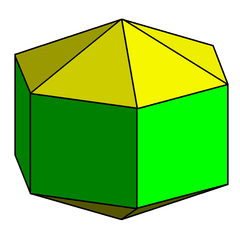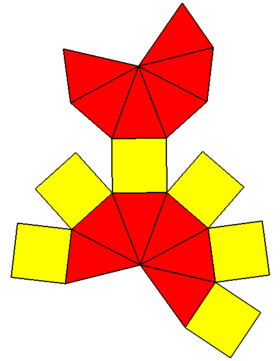Elongated hexagonal bipyramid
In geometry, the elongated hexagonal bipyramid is constructed by elongating a hexagonal bipyramid (by inserting a hexagonal prism between its congruent halves).
| Elongated hexagonal bipyramid | |
|---|---|
 | |
| Type | Elongated dipyramid |
| Faces | 12 triangles 6 squares |
| Edges | 30 |
| Vertices | 14 |
| Vertex configuration | 2 of 36 12 of 32.42 |
| Symmetry group | D6h, [6,2], (*226) |
| Dual polyhedron | Hexagonal bifrustum |
| Properties | convex |
| Net | |
 | |
Related polyhedra
This polyhedron is in the family of elongated bipyramids, of which the first three can be Johnson solids: J14, J15 and J16. The hexagonal form can be constructed by all regular faces, but is not a Johnson solid because 6 equilateral triangles would form six co-planar faces (in a regular hexagon).
Uses
- A quartz crystal is an example of an elongated hexagonal bipyramid. Because it has 18 faces, it can be called an octadecahedron. Other chemicals also have this shape.[1]
- The edge-first orthogonal projection of a 24-cell is an elongated hexagonal bipyramid.
- Used as the shape of Fruit Gushers candy.
- Used as a physical manifestation for assisting various branches of three-dimensional graph theory.
gollark: Or 0.
gollark: The easiest thing is multiplication by 1.
gollark: Oh yes, I'll just multiply things by 10^6, I can DEFINITELY do that mentally.
gollark: It turns out that computer algebra is hard.
gollark: One of my eternally unfinished projects is a CAS/calculator, but it can't do unit conversion.
References
- Controllable synthesis of elongated hexagonal bipyramid shaped La(OH)3 nanorods and the distribution of electric property by off-axis electron holography September 2016, Volume 9, Issue 9, pp 2561–2571
This article is issued from Wikipedia. The text is licensed under Creative Commons - Attribution - Sharealike. Additional terms may apply for the media files.